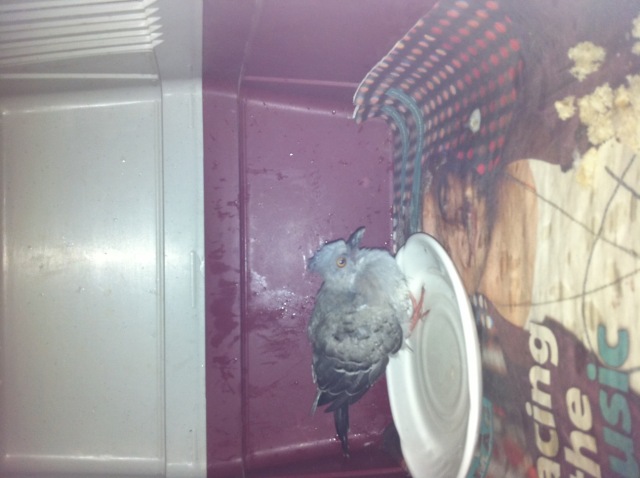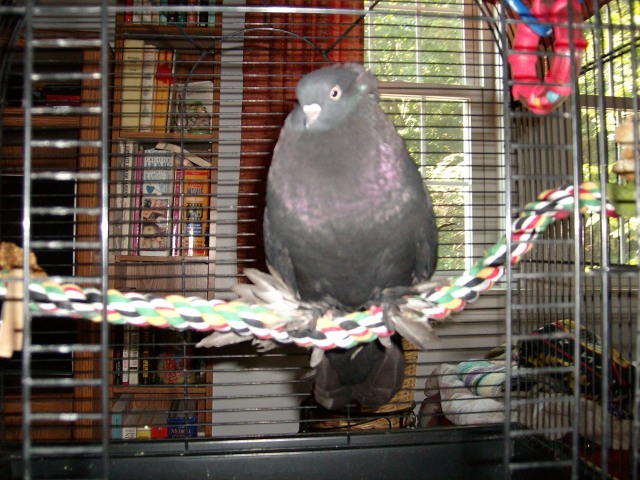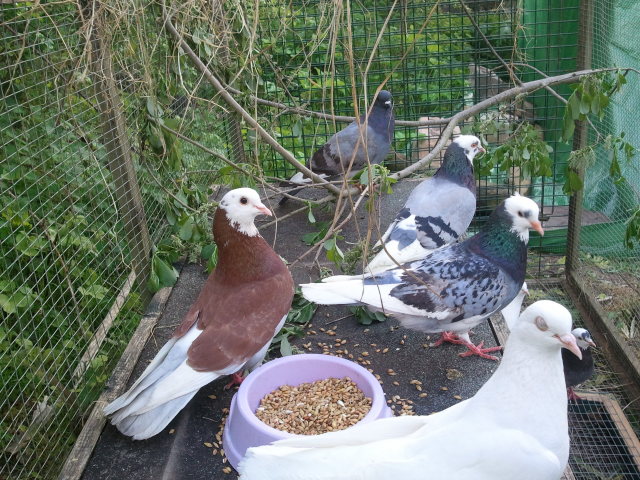QuestionHi! I am so happy there is someone in the pigeon category! :-) My name is Erin and I have a 10 month old pet pigeon named Stewart who is the love of my life! She was hatched on my balcony and I rescued her at 2 weeks old when her parents abandoned her. She is healthy happy and in love with me. She is not caged, has never been in a cage, sleeps with me, showers with me, follows me everywhere. Like I said, she is in love with me. Back in May at 5 months old she laid her first set of 2 eggs. And she has laid 2 eggs about every 27 days since then. She just laid her 11th and 12th eggs this week. I know this is not healthy and can eventually cause problems like egg binding and vitamin depletion. I know there are options like Lupron injections that will help her to not lay so much. My problem is that she does not do well being caged at all. I put her in a travel cage recently to see how she would do and she panicked. I seriously thought she was going to have a heart attach or break a wing. She doesn't do well being handled by other people either. And she is full flighted. So I am afraid that with the trauma of traveling, having to be put in a travel cage, being handled by strangers, etc will not be good. If I didn't think she might possibly have a heart attack from the stress of it all, I would have taken her for shots already. SO...my questions to you are....what do you think is more risky? Letting her lay 2 eggs a month every month, or risking the stress of travel to and being handled by a vet? (the nearest vet is about 25 minutes one way). What are the chances that she will stop the chronic laying on her own? (I've tried everything I can think of...letting her sit on the non fertile eggs, taking them, reducing daylight etc etc nothing helps). I just don't want to make the wrong decision and have something happen to her.
Thanks so much for your time!
Erin
AnswerHi Erin,
Thank you for your question. This is a tricky situation, as you have discovered. It sounds as though you are doing what you can to prevent her chronic egg-laying. I would suggest leaving the eggs with her for as long as she wants to sit on them. I'm not sure if she has a designated nesting area, but if she does, it would be helpful to remove the nest to discourage further egg-laying. If she rebuilds, remove that as well. Try rotating items within your house to discourage territorial behaviors. Reducing the amount of light she is exposed to can help as well, and I would encourage you to try this again (though, daylight period is getting shorter now, which will also help). Does she exhibit sexual behavior towards you? If so, I would stop interacting with her as soon as she displays those behaviors and try not petting/touching her below her neck region. In fact, it may help to decrease as much interaction with her as possible to prevent egg-laying. (Can you confine her to a separate room and enter only to feed/water/check in on her?)
Adjusting her diet can help too, by cutting back on the amount of food you feed her. A balanced diet is important and making sure she has enough calcium to replace what is lost through egg-laying. But if too much food is available to her, she thinks she has enough to feed a family, and thus will continue to lay eggs. Restricting the amount of food available to her may reduce this problem.
I would try the above suggestions for a while to try to stop this behavior. If she continues to chronically lay eggs, then hormone injections may be needed, but this doesn't always work in every case. In extreme cases, surgical removal of the ovary may be necessary, but not without risks associated with surgery.
If you need to take her to a veterinarian or transport her anywhere, it will be beneficial to get her adjusted to being confined to a carrier, box, or cage. Sometimes it helps to cover the carrier/cage with a towel to make it as dark as possible to remove any visual stimuli. Maybe entice her by placing a small amount of her favorite food into the cage and leave the door open so she can investigate on her own.
To answer your question, I would try to get her to stop laying eggs on her own first before stressing her out and resorting to injections. Chronic egg-laying does have its associated problems such as decreased calcium, egg binding, and prolapsed cloaca, so getting this behavior under control is important. If she continues to excessively lay eggs despite everything, I would contact your avian veterinarian to see if they have other suggestions for you and to see if they offer the hormone injections. Pigeons are pretty hardy birds, but we try to minimize as much stress as possible.
I hope this helps! Please let me know if you have any further questions. Keep me updated!
Stacie

 Baby crested pigeon?
Question
Baby pidgeon
Late last night we found a little
Baby crested pigeon?
Question
Baby pidgeon
Late last night we found a little
 What kind of pigeon is this?
Question
fancy pigeon?
My friend just recently left me
What kind of pigeon is this?
Question
fancy pigeon?
My friend just recently left me
 IDENTIFY THIS BIRD
Question
UNKOWN BIRD
I saw this bird among other pigeon
IDENTIFY THIS BIRD
Question
UNKOWN BIRD
I saw this bird among other pigeon
 pigeon/dove breeds
Questionbirds
QUESTION: Hi there,
I already ha
pigeon/dove breeds
Questionbirds
QUESTION: Hi there,
I already ha